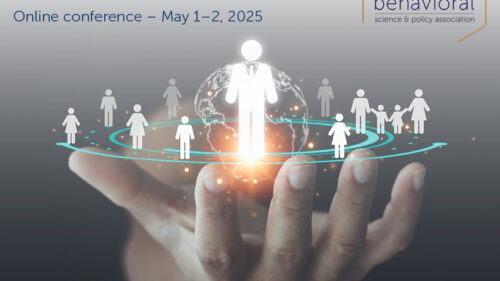Hi, ! Welcome to the BSPA Member Portal!
Here you will find the latest news, events and tweets, curated especially for you. You can also access your library of publications and videos, all in one place.
Latest Updates
Missed the opportunity to attend BSPA 2024? Watch online now!
Call for Submissions & Ask the Editors!
Want to submit a paper to BSP but not sure whether you have the right angle?
BSP has a new ‘ask the editors’ feature available for potential authors. Simply click below to send us an email, and we will respond within 72 hours.
get in touchUpcoming Spotlight Events
BSPA co-hosts a ‘spotlight workshop’ during which potential authors of manuscripts can present relevant work proposing applications of behavioral science within a specific theme or ‘spotlight’ of choice — ideally with a view to publication in our journal. A one-day event is held for a group of researchers, practitioners, and private-/public- sector experts to give feedback to those presenting their research findings, creating an opportunity for the participants to identify new opportunities to inform the research agenda in a particular space. Upcoming spotlights include: Anthropocene-Environment and Political Leadership. If you have any interest in attending or presenting
get in touchSuggested News and Media
-
ONLY 1 WEEK LEFT!!!!!!!
JOIN US at the
2025 Behavioral Science & Policy Association
Online Conference
May 1-2, 2025 (11-5 EST)For more information CLICK HERE: https://www.behavioralscienceconference.com/
Check out the conference schedule HERE: https://behavioralpolicy.org/wp-content/uploads/2025/04/BSPA-Conference-2025-v12.pdf -
Increasing Commuting Via Public Transit
How can we get more people to take public transit rather than drive to work? This article in Slate draws on behavioral science research—some of which was published in BSP — to argue that although commuting habits are deeply entrenched, significant disruptions—such as life changes or external events—can prompt individuals to reassess their travel choices which creates opportunities for interventions that encourage more sustainable options like public transit and biking. Effective change requires both improved infrastructure and behavioral nudges timed to moments of transition.
-
The Rise of the Food Desert
Access to healthy foods is a critical piece of a healthy life, however, people living in food deserts lack convenient access to affordable, fresh groceries. Here, The Atlantic covers the emergence of food deserts and describes what can be done, at a policy level, to improve access to healthy food.
-
The Danger of “Banking” With a FinTech App
The convenient way users can send and store money in Fintech apps like Venmo, has led to a steady increase in their use as an alternative to traditional banks. However, as covered here by Vox, users may be unknowingly exposing their money to risks due to limited FDIC insurance protections, susceptibility to scams, and poor customer service.
-
Twitter’s Proposed Solution to Digital Political Polarization
In recent Congressional testimony, Twitter CEO Jack Dorsey reviewed a “health” initiative for users, including how Twitter could serve as a space to reconcile political opposition. Yet Sociologist Christopher Bail (Duke) cautions against policy action to support Dorsey’s efforts. Bail’s work shows that Twitter may actually lead to further polarization.
-
Decision-Making as a Required Course in School?
Behavioral science probably isn’t what comes to mind when you think of grade school curricula, but writer Steven Johnson is trying to change that. This week, Johnson makes the case for integrating decision-making courses into lower grades. Also, in the Behavioral Scientist, Tom Wein shows us how we can integrate behavioral science into “edutainment” to benefit people at different ages, from kids in school to adults making decisions for later in life.
Our Favorite Tweets This Week
First we turned homes into hotels (Airbnb). Then we started turning office buildings into homes. Perhaps next we will go full circle and turn hotels into office buildings.
— Lisa Kramer (@lisakramer.com) June 17, 2025 at 7:24 AM
[image or embed]
A new study conducted by researchers at the University of Pennsylvania found that tailored feedback to surgeons dramatically reduces excessive opioid prescriptions for common surgeries. www.beckersasc.com/anesthesia/a...
— Center for Health Incentives and Behavioral Economics (@pennchibe.bsky.social) June 16, 2025 at 10:06 AM
[image or embed]
"As the withdrawal of US funding disrupts treatment and halts crucial research in #SouthAfrica, clinics fear the resurgence of mother-to-child transmission of the virus" via @theguardian.com
— IAS - the International AIDS Society (@iasociety.bsky.social) June 16, 2025 at 7:07 AM
[image or embed]
Can a visual values-affirmation intervention improve test scores of students in areas affected by crisis?
Using communication to boost vaccination: Lessons for COVID-19 from evaluations of eight large-scale programs to promote routine vaccinations
Saving for retirement: A real-world test of whether seeing photos of one’s future self encourages contributions
Teamwork doesn’t just happen: Policy recommendations from over half a century of team research
Encouraging self-blinding in hiring
Hierarchy position & personality predict politicians’ choice of information sources
Leadership & overconfidence
Improving election outcomes through a better understanding of heuristic evaluation of candidates
Penalties for going against type: How sexism shapes voters’ perceptions of candidate character
Encouraging COVID-19 vaccination through behaviorally informed reminders: Results from a national randomized field experiment in Israel
Ventilator allocations: The effect of mere identifiability
Nudge versus sludge in gambling warning labels: How the effectiveness of a consumer protection measure can be undermined
Thinking of Submitting a Paper? Ask the Editors!
Want to submit a paper to BSP but not sure whether you have the right angle?
BSP has a new 'ask the editors' feature available for potential authors. Simply click below to send us an email, and we will respond within 72 hours.
Ask the Editors




